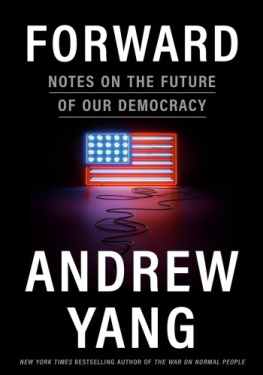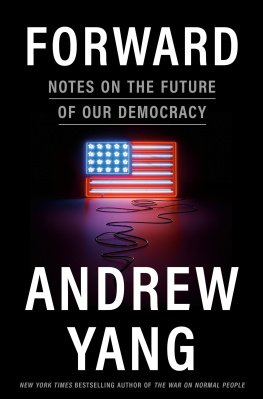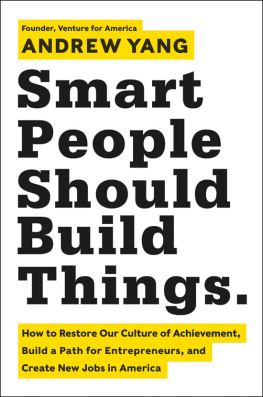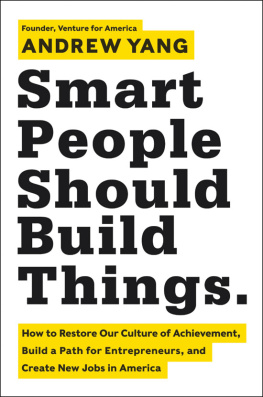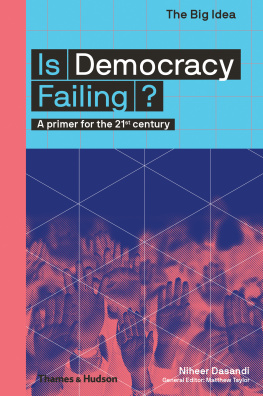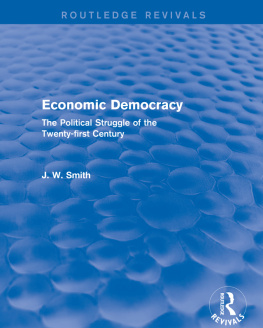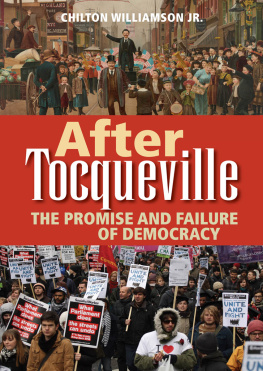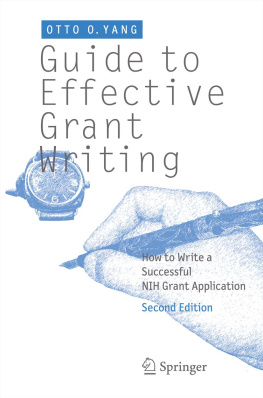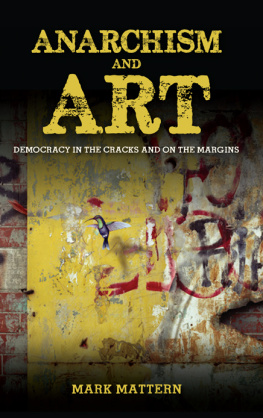Copyright 2021 by Andrew Yang
All rights reserved.
Published in the United States by Crown, an imprint of Random House, a division of Penguin Random House LLC, New York.
C ROWN and the Crown colophon are registered trademarks of Penguin Random House LLC.
Photograph on is courtesy of the Barack Obama Presidential Library.
Library of Congress Cataloging-in-Publication Data
Names: Yang, Andrew, author.
Title: Forward / Andrew Yang.
Description: First edition. | New York: Crown, [2021] | Includes bibliographical references and index.
Identifiers: LCCN 2021029712 (print) | LCCN 2021029713 (ebook) | ISBN 9780593238653 (hardcover) | ISBN 9780593238660 (ebook)
Subjects: LCSH: Yang, Andrew, 1975- | PoliticiansUnited StatesBiography. | Asian American businesspeopleBiography. | Taiwanese AmericansBiography. | PresidentsUnited StatesElection2020. | Political campaignsUnited StatesHistory21st century. | United StatesPolitics and government2017-2021. | United StatesEconomic conditions2009-
Classification: LCC E901.1.Y36 A3 2021 (print) | LCC E901.1.Y36 (ebook) | DDC 324.2092 [B]dc23
LC record available at lccn.loc.gov/2021029712
LC ebook record available at lccn.loc.gov/2021029713
Ebook ISBN9780593238660
crownpublishing.com
Cover design by Christopher Brand
Cover art by Justin Metz
ep_prh_5.7.1_c0_r0
Contents
INTRODUCTION
DEMOCRACY BY A THREAD
W hy isnt it working?
Thats a question millions of Americans have been asking about our country. For some time now, many of us have had this growing sense that our way of life and the shared beliefs and expectations that underpin our democracy have become endangered.
We sense that, somewhere along the way, the machinery of our democracy started falteringand now it is failing.
Politicians tell us to vote and volunteer and endlessly beg us for donations. Many of us do these things. But its not doing the trick.
Despite doing all the right things, many of us are struggling more than our parents or grandparents did to gain a foothold in the middle class. The digital gadgets in our pockets keep becoming more sophisticated, but our basic ability to distinguish truth from fiction is eroding. We can no longer assume that fundamental functions of American democracy, like the smooth counting of votes on Election Day or the ability of Congress to pass laws, will occur. Some of us have stopped believing in science, while others have simply come to doubt the possibility that brighter days lie ahead. The unprecedented disruption of the COVID-19 pandemic laid our anxieties bare. Unity and consensus seem like fading dreams.
Many of us were surprised and horrified at the ascent of Donald Trump, and yet we sense, on some level, that the aggrieved mistrust and political anger he tapped into were real and will continue to exist long after hes gone. As I write this, there is a Democratic majority in D.C. with the slimmest conceivable margins, with Vice President Kamala Harriss tie-breaking vote in the Senate necessary to get anything done. Democracy hangs by a thread.
How did it come to this?
What happened to our belief in the future?
And, most important, what can we do about it?
I WROTE THE initial drafts of the chapters that became this book in a feverish stretch in the months following the end of my presidential campaign. I wanted to capture my experiences and what I learned while it was fresh in my mind, and I poured thousands of words a week onto my computer. Even with my presidential campaign over, my sense of urgency remained about the problems we face. Some of these were specific lessons from the campaign trail, like the perverse dance between presidential candidates and the media. Others reflect beliefs Ive come to hold based on reading, interviews, and working with activists who have spent years trying to sustain our democracy. These initial bits of writing were like a series of mini-essays about the cascading, interrelated set of problems that are growing within our political process and way of governing. Over several drafts, which I completed in early 2021, I shaped these raw writings into proper chapters, stitching them together to form the tapestry of arguments you see here. I hope this book will inspire the same kind of deep reflection in you as my experiences over the past few years inspired in me.
My last book, The War on Normal People, was about the ongoing dehumanization of our economy and the need to adopt universal basic income (UBI) and how it offers us the best chance to evolve to the next stage of capitalism. That is probably how you first heard about me: as the 2020 presidential candidate who wanted to give everyone money.
The War on Normal People had a powerful but narrow goal: to address the crisis in our economy by promoting universal basic income. That book was published in the spring of 2018, just as I was beginning to campaign for the 2020 Democratic nomination. Three and a half years later, I still have the same vision and concerns. If anything, the intervening years have reinforced my convictions about the perilous state of our economy and our democracy. But my perspective on what ails us and my vision for the future have also deepened and advanced based on what Ive learned running for office. I now have a better sense of the challenges to our democratic process. Some of the warning signs of the health of our democracy are flashing red, while others lie hidden, like a bit of faulty wiring, waiting to blow.
This book reflects these advances in my thinking. Compared with The War on Normal People, the scope here is broader, the insights (I hope) are more nuanced, and yet the ultimate theme remains much the same: our economic and political order is facing unprecedented dangers, many of them brought on by new technologies, and only bold new leadership and policies have a chance to overcome decades of political dysfunction and leaders who are rewarded regardless of whether they rise to the challenge.
Ive spent the lions share of the past four years on the movetalking to Americans, listening to their problems, and, through my organization, Humanity Forward, promoting cash relief and experimenting with it at the local level.
In addition to free money, the other thing you might have heard about me is that Im a solutions guy. And after thousands of hours spent talking to my fellow citizens and thinking of the future, I have a sense of how we can put ourselves back on the path to prosperity.
This book is the road map. Its about how to make that visionand, by extension, any actual lasting change on a national scalea reality. Not in the abstract, but for real. Ive found the necessary lever, and Im eager to share it with you.
IN WRITING, I had three primary goals, which are reflected in the books three-part structure. The first is to share my story of running for president, and not because Im interested in recent history. Im sharing it because I learned some useful lessons from it, particularly about the media and the way information spreads today, as well as the misaligned system of incentives underlying how we campaign for elected positions in this country. When I started my campaign for president, no one had any idea who I was. When I announced my run, I was regarded as more of an anonymous oddity or novelty than a viable contender. I eventually found myself onstage in front of tens of millions of viewers debating politicians who had been in the public eye for decades, grooming themselves for their moment for a generation or more.
Somehow, it workedat least for a while. Hundreds of thousands of Americans got behind me and donated to my campaignthank youand thousands dropped everything to campaign or volunteer in Iowa and New Hampshire and around the country. My organization, Humanity Forward, grew to a mailing list of more than a million Americans who support a movement to humanize our economy. How did this happen? I believe my experiences can inform how we can better activate people, grow movements, and improve our own lives.
Next page
